Kia Stonic vs SsangYong Korando – Which car suits you better?
Both models have their strengths – but which one suits you more?
Compare performance, efficiency, price and space directly: Kia Stonic or SsangYong Korando?
Costs and Efficiency:
Price and efficiency are key factors when choosing a car – and this is often where the real differences emerge.
Kia Stonic has a noticeable advantage in terms of price – it starts at 19400 £, while the SsangYong Korando costs 27000 £. That’s a price difference of around 7543 £.
Fuel consumption also shows a difference: Kia Stonic manages with 5.50 L and is therefore distinct more efficient than the SsangYong Korando with 7.50 L. The difference is about 2 L per 100 km.
Engine and Performance:
Under the bonnet, it becomes clear which model is tuned for sportiness and which one takes the lead when you hit the accelerator.
When it comes to engine power, the SsangYong Korando has a significantly edge – offering 190 HP compared to 100 HP. That’s roughly 90 HP more horsepower.
In acceleration from 0 to 100 km/h, the SsangYong Korando is distinct quicker – completing the sprint in 8.40 s, while the Kia Stonic takes 11.30 s. That’s about 2.90 s faster.
In terms of top speed, the SsangYong Korando performs hardly perceptible better – reaching 191 km/h, while the Kia Stonic tops out at 179 km/h. The difference is around 12 km/h.
There’s also a difference in torque: SsangYong Korando pulls decisively stronger with 360 Nm compared to 200 Nm. That’s about 160 Nm difference.
Space and Everyday Use:
Beyond pure performance, interior space and usability matter most in daily life. This is where you see which car is more practical and versatile.
Both vehicles offer seating for 5 people.
In curb weight, Kia Stonic is noticeable lighter – 1195 kg compared to 1517 kg. The difference is around 322 kg.
In terms of boot space, the SsangYong Korando offers evident more room – 551 L compared to 352 L. That’s a difference of about 199 L.
In maximum load capacity, the SsangYong Korando performs minimal better – up to 1248 L, which is about 93 L more than the Kia Stonic.
When it comes to payload, SsangYong Korando barely noticeable takes the win – 463 kg compared to 455 kg. That’s a difference of about 8 kg.
Who comes out on top?
Overall, the SsangYong Korando shows itself to be dominates this comparison and secures the title of DriveDuel Champion.
It convinces with the more balanced overall package and proves to be the more versatile choice for everyday use.
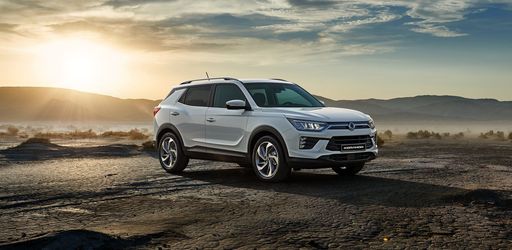
SsangYong Korando
Kia Stonic
The Kia Stonic is a compact crossover that seamlessly blends bold design with practical functionality. Its distinctive, eye-catching exterior is complemented by a well-crafted interior offering a comfortable ride and intuitive technology for today's drivers. The Stonic is perfect for urban environments, providing agility and efficiency without compromising on style or performance.
details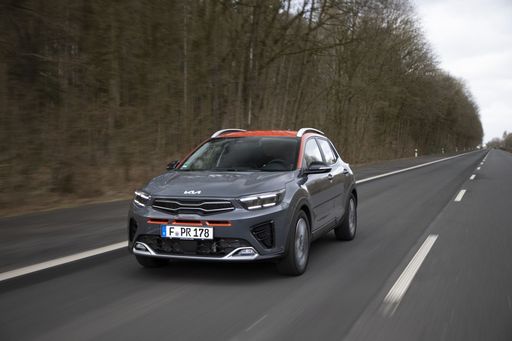 @ press.kia.com
@ press.kia.com
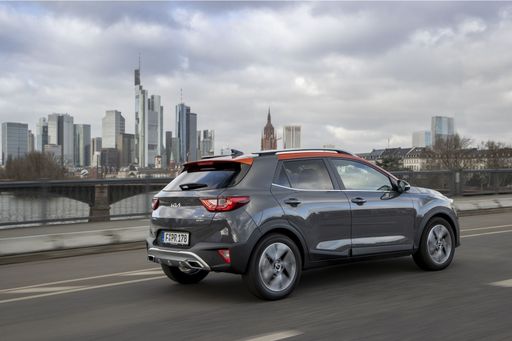 @ press.kia.com
@ press.kia.com
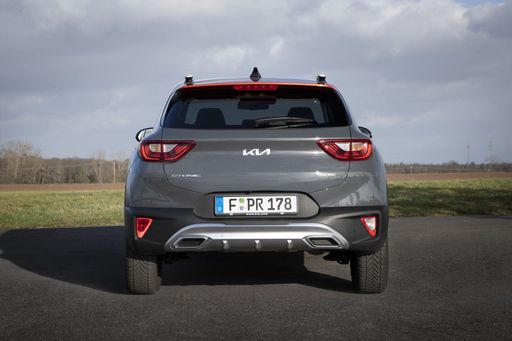 @ press.kia.com
@ press.kia.com
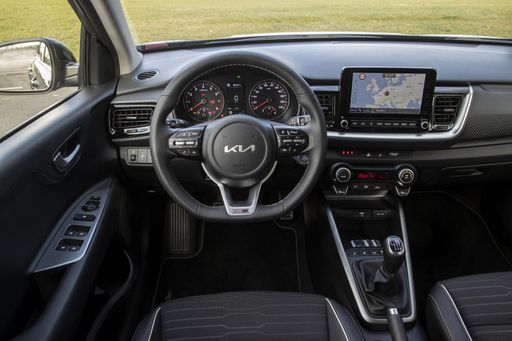 @ press.kia.com
@ press.kia.com
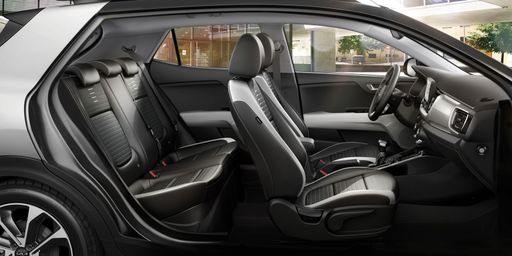 @ press.kia.com
@ press.kia.com
SsangYong Korando
The SsangYong Korando offers a blend of contemporary design and practicality, making it an appealing choice for urban adventurers. Its spacious interior and comfortable seating ensure a pleasant driving experience for both driver and passengers. With its reliable performance and advanced features, the Korando stands out in the competitive SUV market.
details @ Ssangyong
@ Ssangyong
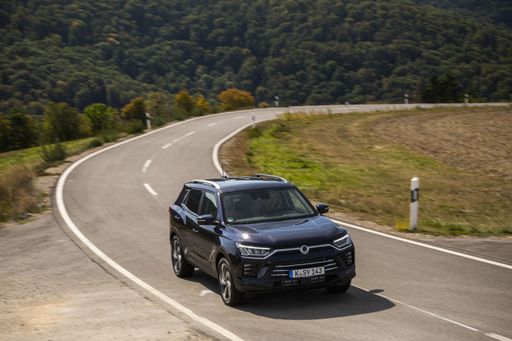 @ Ssangyong
@ Ssangyong
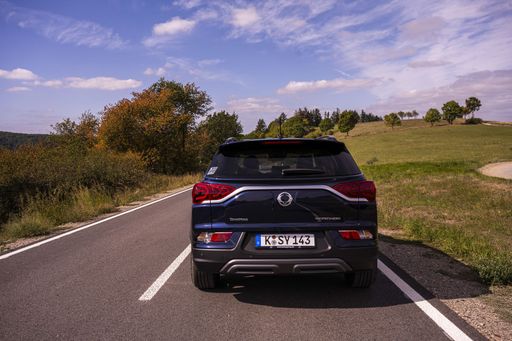 @ Ssangyong
@ Ssangyong
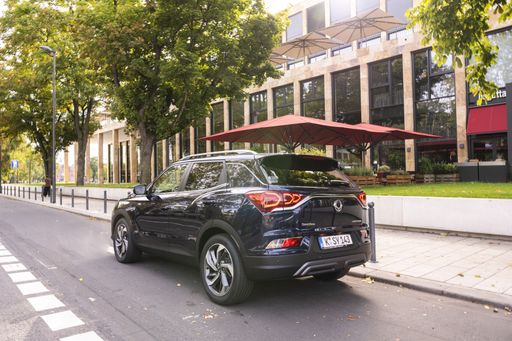 @ Ssangyong
@ Ssangyong
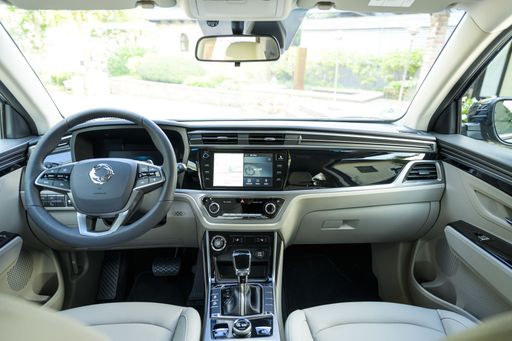 @ Ssangyong
@ Ssangyong

|

|
|
|
|
Costs and Consumption |
|
|---|---|
|
Price
19400 - 25600 £
|
Price
27000 - 42000 £
|
|
Consumption L/100km
5.5 - 5.7 L
|
Consumption L/100km
7.5 - 8.6 L
|
|
Consumption kWh/100km
-
|
Consumption kWh/100km
16.80 kWh
|
|
Electric Range
-
|
Electric Range
339 km
|
|
Battery Capacity
-
|
Battery Capacity
-
|
|
co2
125 - 129 g/km
|
co2
0 - 197 g/km
|
|
Fuel tank capacity
45 L
|
Fuel tank capacity
50 L
|
Dimensions and Body |
|
|---|---|
|
Body Type
SUV
|
Body Type
SUV
|
|
Seats
5
|
Seats
5
|
|
Doors
5
|
Doors
5
|
|
Curb weight
1195 - 1260 kg
|
Curb weight
1517 - 1840 kg
|
|
Trunk capacity
352 L
|
Trunk capacity
551 L
|
|
Length
4140 mm
|
Length
4450 - 4465 mm
|
|
Width
1760 mm
|
Width
1870 mm
|
|
Height
1505 mm
|
Height
1620 - 1645 mm
|
|
Max trunk capacity
1155 L
|
Max trunk capacity
1248 L
|
|
Payload
450 - 455 kg
|
Payload
410 - 463 kg
|
Engine and Performance |
|
|---|---|
|
Engine Type
Petrol, Petrol MHEV
|
Engine Type
Petrol, Electric
|
|
Transmission
Manuel, Automatic
|
Transmission
Manuel, Automatic
|
|
Transmission Detail
Manual Gearbox, Dual-Clutch Automatic
|
Transmission Detail
Manual Gearbox, Automatic Gearbox, Reduction Gearbox
|
|
Drive Type
Front-Wheel Drive
|
Drive Type
Front-Wheel Drive, All-Wheel Drive
|
|
Power HP
100 HP
|
Power HP
163 - 190 HP
|
|
Acceleration 0-100km/h
11.3 - 12.4 s
|
Acceleration 0-100km/h
8.40 s
|
|
Max Speed
176 - 179 km/h
|
Max Speed
156 - 191 km/h
|
|
Torque
172 - 200 Nm
|
Torque
260 - 360 Nm
|
|
Number of Cylinders
3
|
Number of Cylinders
4
|
|
Power kW
74 kW
|
Power kW
120 - 140 kW
|
|
Engine capacity
998 cm3
|
Engine capacity
1497 cm3
|
General |
|
|---|---|
|
Model Year
2024 - 2025
|
Model Year
2021 - 2023
|
|
CO2 Efficiency Class
D
|
CO2 Efficiency Class
F, G, A
|
|
Brand
Kia
|
Brand
SsangYong
|
Is the Kia Stonic offered with different drivetrains?
The Kia Stonic is offered with Front-Wheel Drive.
The prices and data displayed are estimates based on German list prices and may vary by country. This information is not legally binding.
